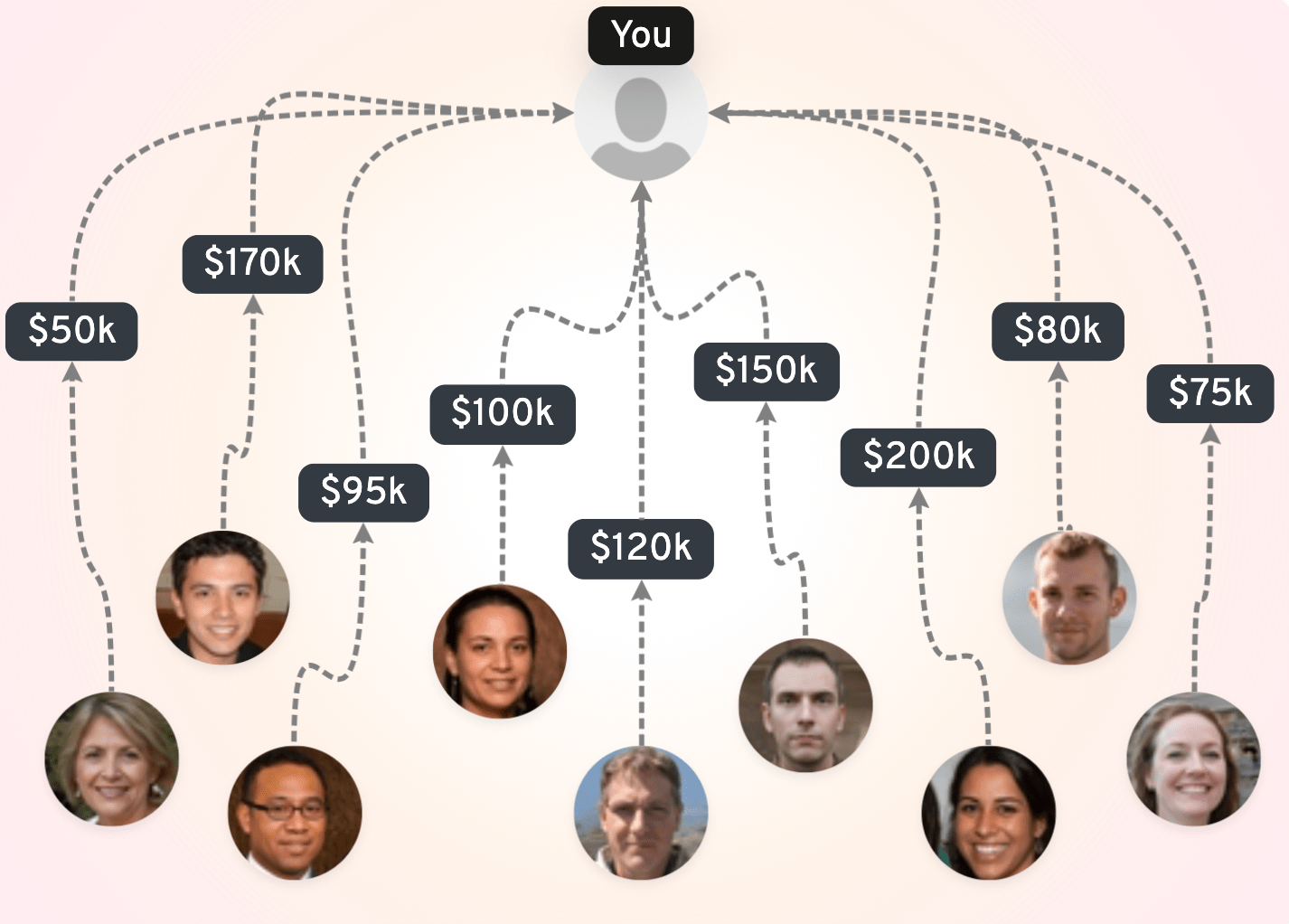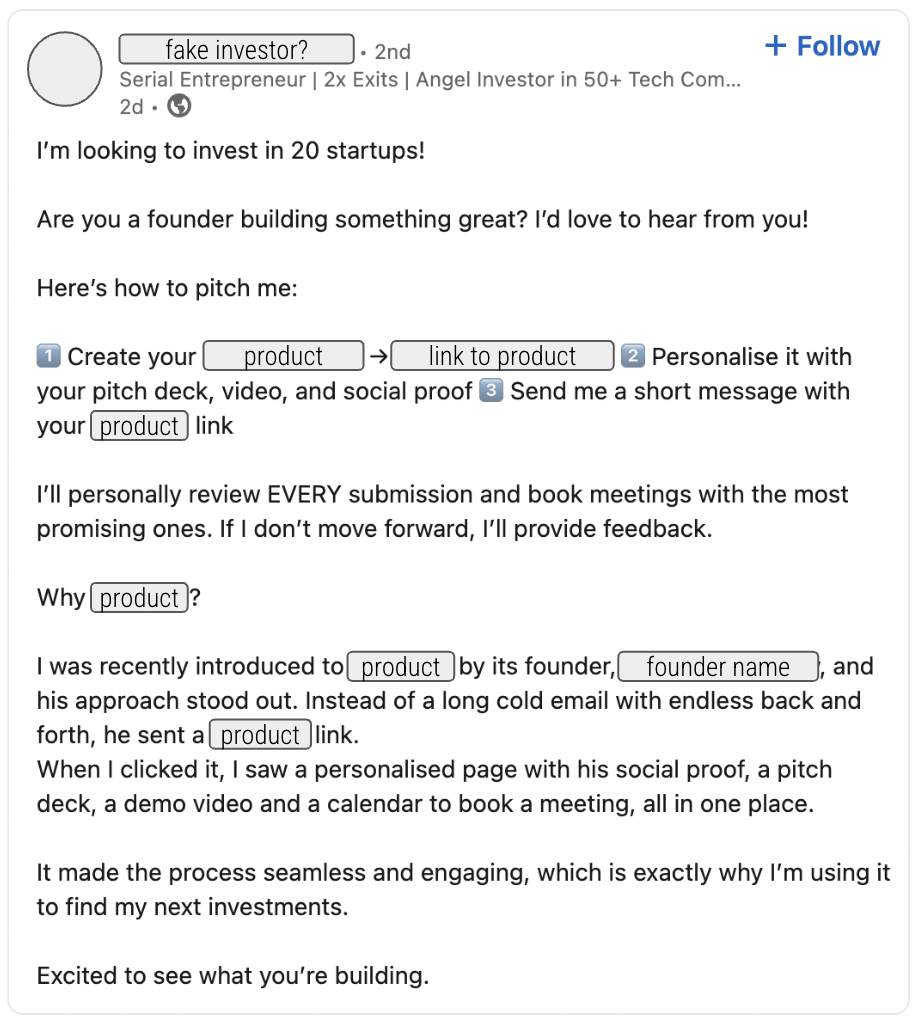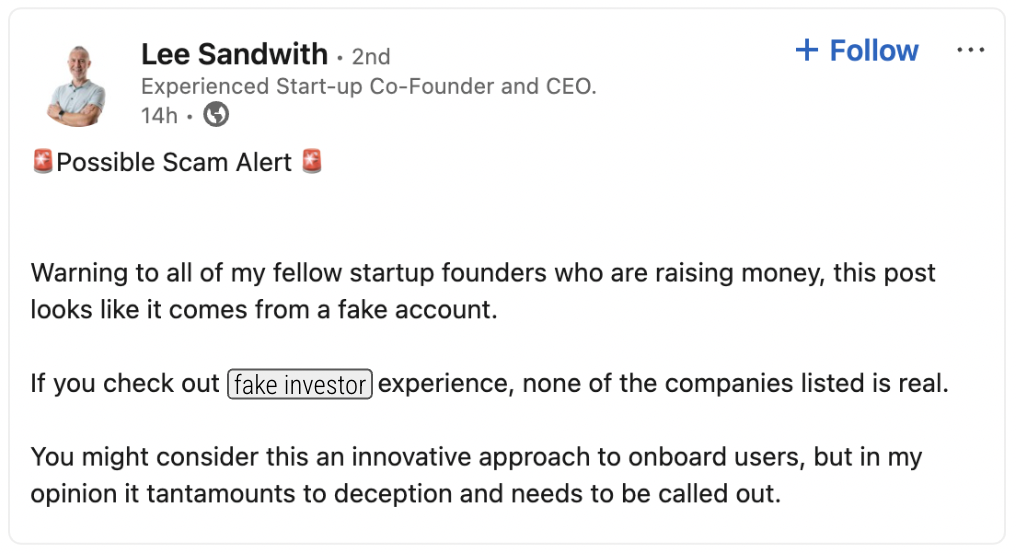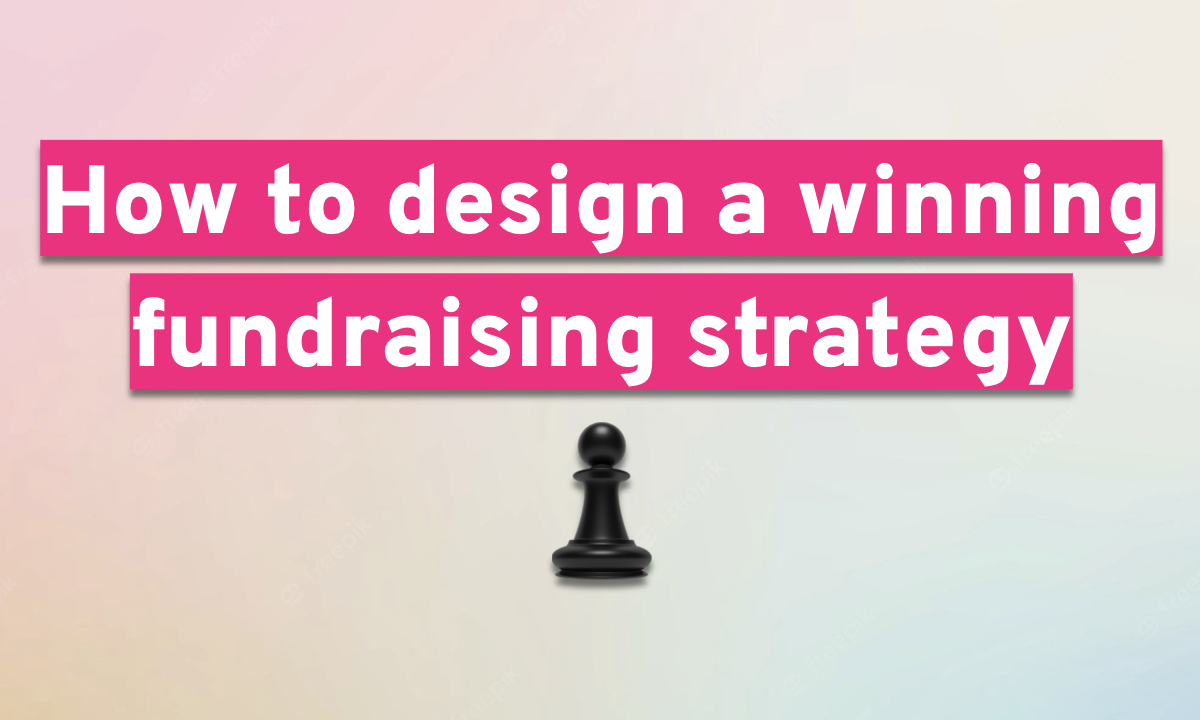If you are raising funds, PLEASE READ THIS FOR YOUR OWN SAKE.
Two weeks ago, I tweeted about funding scams.
It triggered a flood of messages. Founders and investors had a lot to say...
One email in particular stood out:
In this post, I'll break down 14 ways founders get scammed when raising funds.
There will be no name-and-shame. Our only purpose is to educate founders on hostile practices they may encounter, so they can avoid them.
Ready? Let's dive in, from the most innocuous to the most destructive scam.
If you know of another scam, please email me at [email protected] - completely private and confidential.
Table of Contents
Scam #1 - The bait-and-switch
The bait-and-switch is innocuous, but super annoying.
Basically, an "investor" contacts you, you get on a call with them, and at some point, during the call, they start to pitch YOU their fundraising services.
You got it - they're not investors, they're fundraising advisors. And you're in a sales call you never asked for.
I hate this hypocritical, time-wasting practice with a passion.
And you should, too.
(NB: Some fundraising advisors are also legitimate investors, which is fine. The scam is when FAs use bait-and-switch as a systematic practice to generate leads with zero intention to invest themselves).
Scam #2 - The pay-to-play
The "pay to play" also starts with an investor call.
All seems fine, the investor wants to move forward. However, there are some "fees " you need to pay first.
"Due diligence fees" or "Appraisal fees", whatever that means
The general pattern is you pay for A CHANCE to be considered for investment. In other words, you pay first. If you get nothing in return, tough luck.
Here's what such a contract looks like in the real world:
It's bonkers, and a genius business model. Easy $5k/month after tax, and full remote, too!
As a general rule, do not pay for the investors' costs. The only exception is covering some DD/legal fees at round closing i.e. when you know the money is coming.
So, don't pay to play.
Scam #3 - The pay-to-pitch
A variation of the pay-to-play.
Here, founders are charged to pitch in front of investors.
Paying to pitch doesn't make sense. If you're a good opportunity, investors should want you to pitch them, not the other way around. If you're a bad opportunity, paying won't solve anything.
What's even crazier: investors themselves get tricked into joining those paid pitches.
Here's what a British investor shared with me:
I was asked to be a judge on startup pitches. The startup will pay to pitch (WTF). Anyway they were told that I am actively investing in ‘their’ area and am going to be judging and all that other stuff. Honestly I have seen this so many times from founders who opened up to me, it's part of the reason a few years ago I stopped doing this stuff.
(NB: Don't get confused. Some investors have side gigs. They may charge for an advisory call or to review your pitch deck. This is separate from their investment activity, and they usually mention it clearly.)
Find your ideal investors now 🚀
Browse 5,000+ investors, share your pitch deck, and manage replies - all for free.
Get Started
Scam #4 The VC on payroll
This one is quite creative.
The "VC on payroll" or "investor on payroll" happens when an investor agrees to invest, but receives a paid position in your company in return.
Imagine: Johnny Angel invests $40k in your startup, but in exchange, you have to hire Johnny as an "advisor" for $2k/month. Within 2 years, Johnny has recovered 120% of his money AND also owns equity in your company. Lol.
In a normal world, an investor will advise you for free.
For one thing, it's in their own interest to do so. For another thing, taking a few hours per quarter to advise you doesn't justify a paid position.
Now, if you really need an advisor with heavy commitment, make it a separate conversation and set up an appropriate compensation model.
Scam #5 - The "heads I win, tails you lose"
Sometimes, investors demand abusive terms to cover their a**es.
The worst case I've seen was a Chinese term sheet. The founder was personally responsible for reimbursing the investor if the business failed.
At this point, it's not a venture deal - it's a loan in disguise.
Just don't.
Scam #6 - The "we know him"
Another trick used by indelicate broker-dealers and fundraising advisors was reported to me by a GP:
"This happens to me a lot! 3 times this week and that's the ones I know about. Been happening for at least 9 years.
People will add me on Linkedin. Then go to a mobility startup and say “hey we know him really well and they have done this, this, this etc.” I have seen email streams of people saying they know me to the point I have even questioned if I have it wrong.
The truth: I spoke to him once on an investment call, but can see he spends every day on my Linkedin."
So yeah, if someone conveniently knows every partner in every fund you want… you're allowed to have some doubts.
Scam #7 - The "let's do equity instead"
This one is a psychological trick.
You're starting the conversation with an advisor. You like them, they seem legit, they could definitely open doors for you: investors, clients, partners... Great.
How much do they charge? $5,000/month. Ugh, there's no way you can afford that.
But wait, you're in luck!
They like your project so much they're ok to charge equity instead. So they'll advise you for just 4% of your cap table.
What if those intros are unsuccessful? Well, they get to keep the 4%...
Yeah, I was surprised, too, but it's actually a thing.
It works because they start with a pay-to-play approach, then switch to equity, and you feel like they're actually in your corner.
They're not. You don't want 4% of your cap table owned by strangers whose main value is filling up the Team slide on your pitch deck.
Hard pass.
Scam #8 - The "Use this app to apply"
This scam is actually a lead generation hack targeting founders.
It usually happens on LinkedIn. A fake investor claims they are looking to invest. And they will ask founders to use a specific product to send their deck or schedule a meeting.
It looks something like this:

But when you look at the investor's profile, it's all smoke and mirrors. Kudos to Lee Sandwith for spotting the grift calling it out - and thanks Ari for tagging me!

Scam #9 - The drag-and-drop
Now, we're entering the realm of stuff actual VCs do.
The drag-and-drop is when an investor drags the process forever while assuring you they will invest. They may even give you a term sheet.
Then, as your runway gets thinner and you stop chasing other investors, they drop the bomb.
"Valuation is too high." "Funding comes in tranches." Whatever.
It's a bad deal, and you're out of options.
Don't get dragged. It hurts when you get dropped.
Scam #10 - The spearfishing
Another dick move.
An investor contacts you, asks for a pitch, gets access to your data room. Then they go silent.
Congrats, you've just been spearfished!
The investor never had the intent to invest. Instead, they wanted to gather information, maybe for a competitor, maybe because it's free market research.
It sucks, but it's a rare occurrence overall.
Scam #11 - All accelerators?
A few people reached out about accelerators. "They are all scams."
It's not that simple.
Here's how you should keep in mind when considering an accelerator.
- If an accelerator doesn't invest cash in your startup, it's not really an accelerator - it's a service provider. Nothing wrong with that, but don't think you're joining an accelerator - you're a client buying a service. Beware scams #3 and #7.
- People complain that accelerator deals are not competitive. Sure, $200k for 8% might seem excessive. However, accelerators invest when VCs and angels won't. So there's no comparison to be had. For many founders, that $200k check is the only funding available.
- The value proposition of an accelerator relies on their "value-add" i.e. guidance, insights, connections, coaching, etc. That value-add may be worthless to an experienced founder but extremely valuable to a first-time founder. So it's not one-size-fits all.
Keeping all of this in mind, many accelerators do a good job. Of course, some are also truly bad. They overpromise and underdeliver.
But hey, that's not exclusive to them.
Scam #12 - The crazy good deal
A classic one.
This amazing VC offers to invest MORE than you actually need. He's also ready to set the valuation HIGHER, so you retain enough equity. What a great deal!
Of course, you can see what's happening:
- A higher valuation means that the next round will be harder to raise, exposing you to the risk of a downround.
- The VC will request clauses to protect their investment, such as 3x liquidation preferences. They may end up getting more of your equity, and you less.
Today's deal looks great, but tomorrow's exit might look like this:
Scam #13 - The dirty sheets
This one happened again just last night.
An OpenVC founder received a really dirty term sheet, and was only saved from it thanks to an OpenVC investor who took notice and flagged it via email:
You can really sneak anything into a term sheet. As long as both parties agree to it, it's fair game.
So pay attention, make sure to keep your sheets clean.
Scam #14 - The lethal vesting
This one is quite niche, but definitely takes the cake.
(real story)
A VC firm brings in an external CEO for a struggling portfolio startup. Here's the deal they offered to the new CEO:
"We need the company investment ready ASAP, and a 2MM round within 12 months. Don't worry about finding new investors, we have a large list ready to meet with us, you just need to present a good story. Once the round closes, you'll get 10% of the company and the co-founder title."
The new CEO gets to work immediately. Turns out the VC didn't have any new investors lined up for meetings. First red flag.
Regardless, the new CEO went on like a champ and managed to secure two (!) term sheets from top VCs in just 11 months.
Then, here's what happened:
Legal? Yes. Lethal? Absolutely.
There are no VC scams, only poorly informed founders
Fundraising is the perfect stage for scammers:
- 1,000s of new founders you can cycle through every year
- First-time founders who are ignorant of standard practices
- Emotional people who are easy to manipulate
This space is a continuous flow of uninformed, irrational prey ready to be abused. I'm not exaggerating.
The truth is many founders have no idea what they're doing.
They're raising for the first time and just figuring out how things work. They're used to evolving in environments made safe for them by consumer protection laws, the HR department, or a bunch of invisible processes and failsafes.
But when you're raising funds, you're on your own.
Fundraising isn't rocket science, but you should do your homework and use your brains. Don't fall prey to grifters and bad actors.
Here are my 10 common sense rules to raise safe:
- Always be skeptical. There's no such thing as free lunch. If something sounds too good to be true, it is.
- Educate yourself. Fundraising is mostly standardized. Just read up or ask around. Hell, post your question on Twitter or LinkedIn and tag me in the replies.
- Tie compensation to results. Not always possible, but you want to align interests between you and your stakeholders.
- Research the investor portfolio. Try to see if they invested in competitors. You won't always find out, but it's a low-hanging fruit.
- Do reference checks. What's stopping you from DMing 3-4 portfolio founders before signing a term sheet?
- Get things in writing. It will force you to think things through and provide a bit of legal protection.
- Don't put confidential stuff in your pitch deck. Your deck will be shared, there's nothing you can do about it. Act accordingly.
- Use a two-stage data room. We wrote extensively about it here.
- Lawyer up. Work with a legal counsel who has experience in startup fundraising. Yes, it's not cheap, but that's the cost of doing business.
- Never stop raising. One term sheet is not enough. You want options. You want leverage. There's no deal until the money is in the bank.
Do that, and you'll be fine.
Oh, and there are scammy founders, too. I'll do a post on these guys next time!
Wanna react to this post? Join the conversation onTwitter or Linkedin!
Find your ideal investors now 🚀
Browse 5,000+ investors, share your pitch deck, and manage replies - all for free.
Get Started










